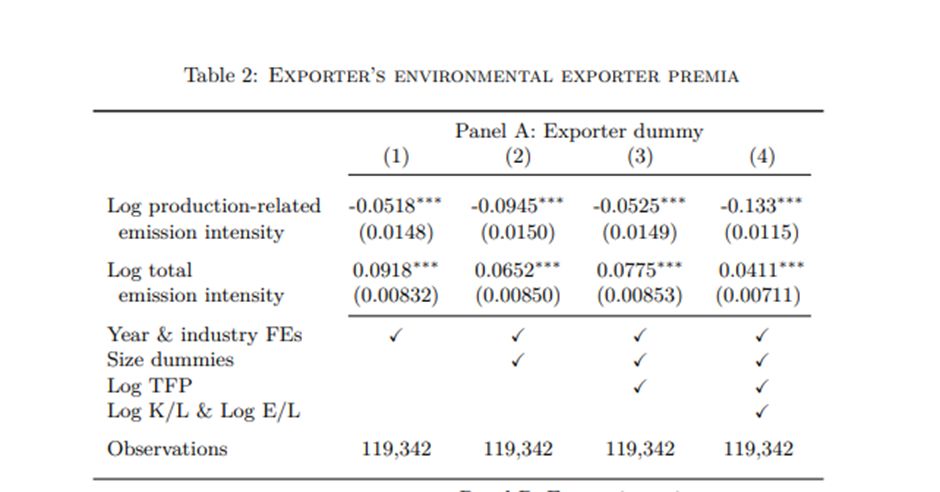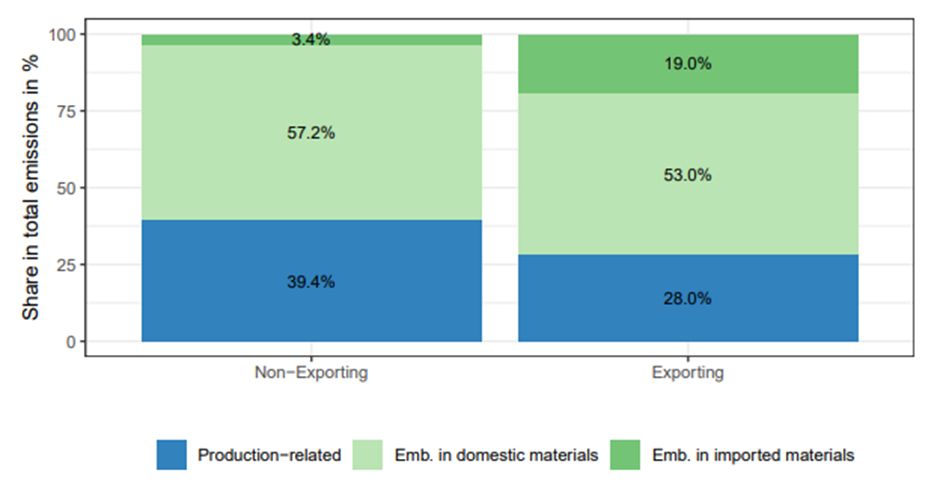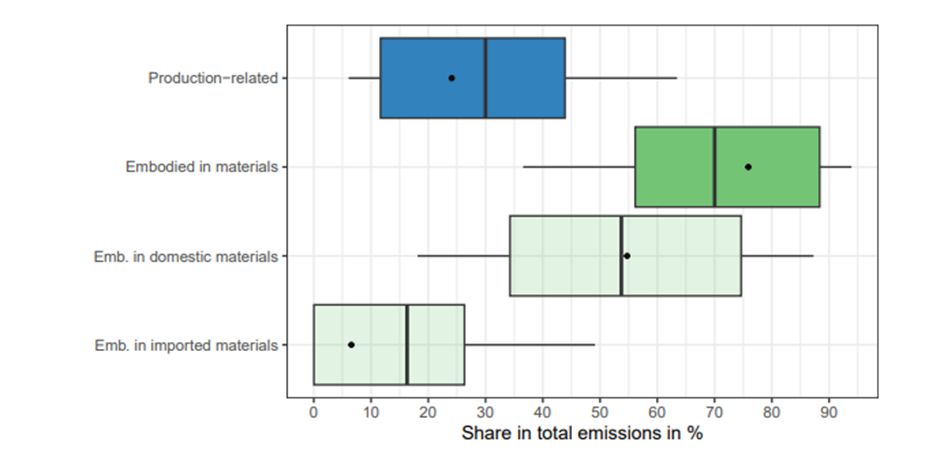Robin Sogalla
@rsogalla.bsky.social
Econ PhD candidate @DIW. Research on Climate Policy and International Trade.
8/Looking forward to feedback and discussion!
#EnvironmentalEconomics #TradeAndEnvironment #Scope3 #CarbonAccounting #FirmLevelData #GlobalSupplyChains
#EnvironmentalEconomics #TradeAndEnvironment #Scope3 #CarbonAccounting #FirmLevelData #GlobalSupplyChains
July 9, 2025 at 7:57 AM
8/Looking forward to feedback and discussion!
#EnvironmentalEconomics #TradeAndEnvironment #Scope3 #CarbonAccounting #FirmLevelData #GlobalSupplyChains
#EnvironmentalEconomics #TradeAndEnvironment #Scope3 #CarbonAccounting #FirmLevelData #GlobalSupplyChains
7/
We test the model’s prediction with a shift-share IV strategy:
▶️ Rising foreign demand reduces firms’ production-related emissions intensity
▶️ But does not affect the total emissions intensity, which includes embodied emissions
We test the model’s prediction with a shift-share IV strategy:
▶️ Rising foreign demand reduces firms’ production-related emissions intensity
▶️ But does not affect the total emissions intensity, which includes embodied emissions
July 9, 2025 at 7:57 AM
7/
We test the model’s prediction with a shift-share IV strategy:
▶️ Rising foreign demand reduces firms’ production-related emissions intensity
▶️ But does not affect the total emissions intensity, which includes embodied emissions
We test the model’s prediction with a shift-share IV strategy:
▶️ Rising foreign demand reduces firms’ production-related emissions intensity
▶️ But does not affect the total emissions intensity, which includes embodied emissions
6/ Why does this happen?
We build a model where exporters source more intensively (and differently) due to larger market size — which leads to cleaner production, but potentially more emissions embodied in materials.
We build a model where exporters source more intensively (and differently) due to larger market size — which leads to cleaner production, but potentially more emissions embodied in materials.
July 9, 2025 at 7:57 AM
6/ Why does this happen?
We build a model where exporters source more intensively (and differently) due to larger market size — which leads to cleaner production, but potentially more emissions embodied in materials.
We build a model where exporters source more intensively (and differently) due to larger market size — which leads to cleaner production, but potentially more emissions embodied in materials.
5/ 3. The established finding that exporters are less emission-intensive reverses once embodied emissions are accounted for.

July 9, 2025 at 7:57 AM
5/ 3. The established finding that exporters are less emission-intensive reverses once embodied emissions are accounted for.
4/ 2. Embodied emissions are more important for exporters, especially those embodied in imports, than for non-exporting firms

July 9, 2025 at 7:57 AM
4/ 2. Embodied emissions are more important for exporters, especially those embodied in imports, than for non-exporting firms
3/ 1. Embodied emissions account for more than 50% of total emissions for most firms.

July 9, 2025 at 7:57 AM
3/ 1. Embodied emissions account for more than 50% of total emissions for most firms.
2/ We combine administrative German firm-level data with an environmentally extended input-output database to build firm-specific emissions intensities — covering:
▪️Production-related emissions
▪️Emissions embodied in domestic inputs and imported inputs
🔍 We document three stylized facts:
▪️Production-related emissions
▪️Emissions embodied in domestic inputs and imported inputs
🔍 We document three stylized facts:
July 9, 2025 at 7:57 AM
2/ We combine administrative German firm-level data with an environmentally extended input-output database to build firm-specific emissions intensities — covering:
▪️Production-related emissions
▪️Emissions embodied in domestic inputs and imported inputs
🔍 We document three stylized facts:
▪️Production-related emissions
▪️Emissions embodied in domestic inputs and imported inputs
🔍 We document three stylized facts:
1/ A substantial share of global emissions is embodied in trade flows.
▶️How important are embodied emissions at the firm level?
▶️Does accounting for them affect the established finding that exporting firms produce less emission intensively?
▶️How important are embodied emissions at the firm level?
▶️Does accounting for them affect the established finding that exporting firms produce less emission intensively?
July 9, 2025 at 7:57 AM
1/ A substantial share of global emissions is embodied in trade flows.
▶️How important are embodied emissions at the firm level?
▶️Does accounting for them affect the established finding that exporting firms produce less emission intensively?
▶️How important are embodied emissions at the firm level?
▶️Does accounting for them affect the established finding that exporting firms produce less emission intensively?

